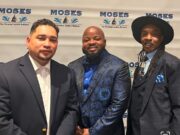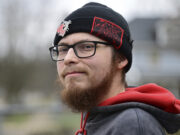“We need to expect much from our low-income students of color and meet their needs because they will deliver. It’s really about teachers, staff members, and family members taking some extra steps to show the students that they do have the skills … it’s just a matter of tapping into them with appropriate material and teaching style,” says Michelle Belnavis. “Once you provide that, I’ve noticed it makes a difference. And that’s how Read Your Heart Out has grown into really focusing in on showing the possibilities for all of our students.”
Belnavis is really excited about her upcoming “Read Your Heart Out” event which she founded 13 years ago to build positive family, community, and school relationships here in Madison. The event provides a vehicle to open up dialogue among teachers, parents, and students that have led to a more conducive learning environment for every student, from kindergarten through college. Parents are encouraged to participate at Read Your Heart Out and they very often do. This is year number 13 for this annual event.
“I’ve tried to add something to it every year that we’ve done it to improve it. It’s 13 years old now so I kind of consider Read Your Heart Out to be in its teenage years,” Belnavis tells Madison365, laughing.
Now at 25 different schools in three cities, Belnavis started Read Your Heart Out at Midvale Elementary School back in 2004 on Madison’s west side. The idea was to recruit African-American family members and community members as readers to read to young people to build positive family, community and school relationships.
“I remember finding early on – in the early days of Read Your Heart Out – that if I gave the students the right books and if I engaged them with stories that really reflected their life experiences … they were successful,” Belnavis recalls. “I invited the families in to look and see what these students can do because before that they kept getting told that they can’t.”
“Read Your Heart Out” grew to five schools and was soon held to coincide with “100 Days of School” and National African American Parent Involvement Day (NAAPID). Ann Arbor, Mich., Public Schools Principal Joseph Dulin conceived the idea of a NAAPID after accepting the challenge given at the Million Man March to return home and do more to build, involve, and increase their commitment to improving the quality of life in their community, particularly for African Americans.
“So the 100 Black Men of Madison were invited to come in and read and observe. From that moment on it just grew each year to include more community members, more students, more organizations, pastors, churches, community leaders, and media,” Belnavis says. “And we grew to more and more schools throughout the district.
“Starting out, I never thought it would be this big,” she adds.

In 2009, the event evolved into a collaborative initiative with Andreal Davis from the Department of Diversity and Equity/Central Office Literacy Department at MMSD. Through this partnership, the event grew to include professional development for schools around cultural relevance and literacy.
Schools now have to train for one year before they can host the event.
“We have taken the approach where we train teachers now because it has grown to 25 schools. We’re training Read Your Heart Out readers now and we’re calling them ‘Learning Partners,’” Belnavis says. “There’s such a demand now to have an event that really focuses on parent engagement, specifically for our African American families.”
As the technical assistance coordinator for cultural responsiveness for the State of Wisconsin Response to Intervention Center, Belnavis helps teachers, schools and districts with how to think about how to make their instruction and curriculum more culturally responsive to the students and families they serve. She and Davis – now culturally responsive practices coordinator at the Wisconsin RtI Center – have collaborated with the center to offer this opportunity to a statewide audience while reinforcing the culturally responsive core of the Wisconsin RtI Center’s work.
In the last few years, “Read Your Heart Out” has spread to two other school districts – Beloit and Sun Prairie. It takes place every Friday in the month of February. The first Read Your Heart Out event took place at Hackett Elementary School on Friday, Feb. 3.
“That was an amazing event. One of the things I noticed there at the kickoff that was really so validating for this event was that the [Beloit School] District leadership was present,” Belnavis says. “The superintendent of the Beloit School District, as well as the Early Education Student Service Director, were there to really support the event. The presence of leadership makes a huge, huge difference, too.”

Belnavis hopes to build up the comfort level for African-American parents to become more involved in their children’s school. The event helps to establish a foundation for teachers and parents to help their children succeed academically.
“The even highlights culturally responsive literacy, community involvement, and parent engagement, but it should also be something that sets the stage to continue past that event,” Belnavis says. “It should go on throughout the entire school year. This isn’t just a one-time thing; it should be something that inspires you to continue to embrace, engage, and empower families and communities.”
In the end, “Read Your Heart Out” is about building community and building partnerships, but it’s also all about the kids.
“I really like getting all of the positive feedback from the kids at the end of the day. Every time I go I ask them how they fell about Read Your Heart Out Day and they say, ‘This is the best day of my life!’” Belnavis says. “That’s the kind of stuff that makes me keep on wanting to do it. They feel such a sense of belonging and having fun and being able to be free to express themselves culturally. There’s such a connection to their inner soul.”


































